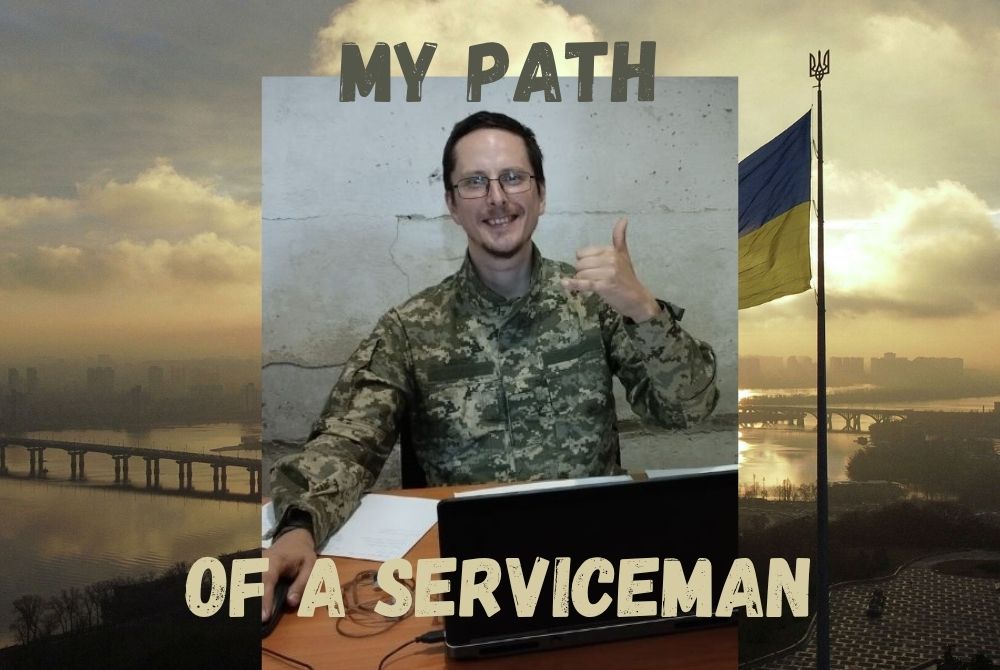This article will be another of my philosophical reflections. It was born when I drove a little further away from the front line for a day, to the city of Zaporizhia. We had to register new arrivals from the TCC. And so, on our way back, the guys decided to stop by one of the shopping centers to buy some clothes. I decided to seize the moment, bought myself some delicious ice cream, and sat down on the parapet of one of the central streets of Zaporizhia. After sitting and living in a basement all day long, listening to the sounds of people coming and going, it was somehow pleasant, unusual, and even “special” to just sit there and calmly eat ice cream. I began to simply observe the people walking down the street, passing by me.
And so, sitting and watching civilians going about their business, or mostly just walking around, I felt a kind of wall or abyss between the military and civilians. The girl, a combat medic, who was sitting next to me, also confirmed that she felt the same way. What I was looking at was somehow incomprehensible (yes, in two months I had already forgotten what civilian life was like :). As I sat there watching people, it somehow reminded me of how, as a child, I would sometimes sit by a large aquarium and watch the fish swimming there. It was another world; the fish were swimming somewhere, doing something, and it was interesting to watch.
And I wondered, “Why is this happening? Why is there such a gap between military and civilian people? Why does it feel like two different worlds?”
Some might say, “Well, because the military loves weapons, war, gunfire, explosions, etc.” I can tell you for sure — no. Maybe there are some unique individuals who like all that, but they are probably 1-2 percent. Talking to different people who have been in the army for a long time and take their work seriously, to my surprise, when the topic of whether they like army life comes up, they say confidently and without hesitation that no, they don’t like it. They say that as soon as the war is over, they will return to civilian life.
The situation here is more like this. There is a house where many people live. And one day, someone shits near the door. Some people continue to live their lives, while others are concerned about it and fix the situation, going to clean it up, even if it’s not pleasant. Or, the door breaks, and some people just carry on with their lives, while others get upset about it and go and fix it.
For example, as I have seen, there is no such gap between the world of civilian volunteers and the army, i.e., the military. They are on the same wavelength.
I checked with myself and my colleagues, the clerks, and it’s not surprising that people don’t want to take up arms. No! To be honest, we clerks ourselves don’t want to take up arms. What is surprising is that when there is an urgent problem, people try to simply ignore it.
There are many stories about various conflicts between the military and “draft dodgers.” You might think that the military is triggered by the fact that “draft dodgers” don’t want to take up arms and kill someone. In most cases, no. The military is triggered by the fact that draft dodgers simply don’t care about anything; they simply shirk their duties and responsibilities.
From what I’ve heard, in other countries, when soldiers returned to civilian life after the war, they often couldn’t adapt, and they wondered, “What did we fight for? Who needs this?” Perhaps our goal is to ensure that returning soldiers do not ask themselves this question. And the point is not only to respect the returning soldiers, but, perhaps above all, to respect what they are defending.
And I think it is a big mistake to confuse concepts. For example, when people find something bad in our country, they say, “So, was it worth giving your life for this?” In other words, when people see something bad, they assume that this is what soldiers died for in the war. People see some despicable individual in a fancy car and conclude that people died for this individual. Yes, that despicable individual in a fancy car, who only thinks about themselves, is not worth the deaths of our heroes. Therefore, when we see something negative in our country, we should not use it to belittle or diminish the merits of those who defend this country.
So what are most of the soldiers fighting for in this war? I asked them. And the answer was — not for the president, and not even for Ukraine. They are fighting first and foremost for what is most sacred, for their families, for their loved ones. They are also fighting for their land, where they can live freely. From all this, I can draw a rather strange but logical conclusion: it turns out that our tribute and gratitude to all the fallen heroes is to uphold family values and care for the land they defended. Family, family values, and love for the land. That is what is most important.
I remember myself before I joined the Armed Forces of Ukraine. When I saw soldiers on the street, on the one hand, I felt respect and gratitude towards them. But on the other hand, this whole “world” of war, weapons, blood, and murder was so distant to me that I couldn’t just walk up to them and start talking. I don’t understand what they went through, I didn’t understand what was in their hearts. That’s why I often avoided meeting them.
On the other hand, I don’t think that civilians and soldiers should be united by the horror of war. As soon as the opportunity arises, people will try to forget all these horrors — explosions, blood, and death.
Therefore, perhaps we should not glorify masculinity and military technology. Everyone should wear pixelated clothing, etc. Because such things are naturally forgotten after the war ends; there is no need for them in peaceful life. Perhaps we should not view a soldier exclusively as a man who can shoot accurately. Instead, we should see him as a hero who has devoted all his strength to a bright future for Ukraine.
And these things should not be separated!!! Here is the key point of the idea – these two things cannot be separated! War heroes are great only because of the greatness of what they are fighting for. Accurate shooting with a Hi-Marss in itself is not great.
I think the ideal is that when the war is over, a young, still green guy will approach a war veteran and honestly say, “I have no idea what life in the trenches is like, I don’t know what war is, I will never understand what you went through. But I appreciate what you defended. And now I will try to realize this dream and idea for which you risked your lives.
Therefore, I believe that we need to think carefully about the idea of the Ukraine for which our soldiers are now giving their lives. It is this idea that can unite these two worlds — the military and civilians.
To better convey the idea, I will give an example of a fictional story. In a certain country, everyone decided that they would try to create strong families and take care of nature. And everyone agreed that the symbol of this dream would be a coat of arms with a man, a woman, and a child between them. This coat of arms was shaped like a circle, for example. Then a horde of orcs attacked this country. This coat of arms hung in the homes of civilians, and people looked at it and remembered their dream. It also hung in the trenches of the defenders. The defenders looked at it and remembered what they were fighting for. This coat of arms becomes familiar and somewhat sacred to them. And then the warrior returns home, where he sees this coat of arms everywhere, a coat of arms that has become something sacred to him. He sees people who feel the same way about it. These people know nothing about the horrors of war, about severed limbs, etc. But there is something that unites them. The soldier defended it with his life, and the people around him live with the dream of making it a reality. In their eyes, the soldier is not just a dude who can shoot a gun really well, he is the one who defended their dream, defending it at the risk of his own life.
In closing this article, I want to say that, unfortunately, this idea is quite vague in our society right now. Different people say different beautiful and inspiring words, but there is no common central idea or dream. There is only one clear idea—to defend ourselves and survive. But that alone is not enough. We need to search for and find this idea. Or even just catch it, because sometimes it seems to me that this idea is already hanging in the air, falling from the lips of some people. We need to find our common dream.




